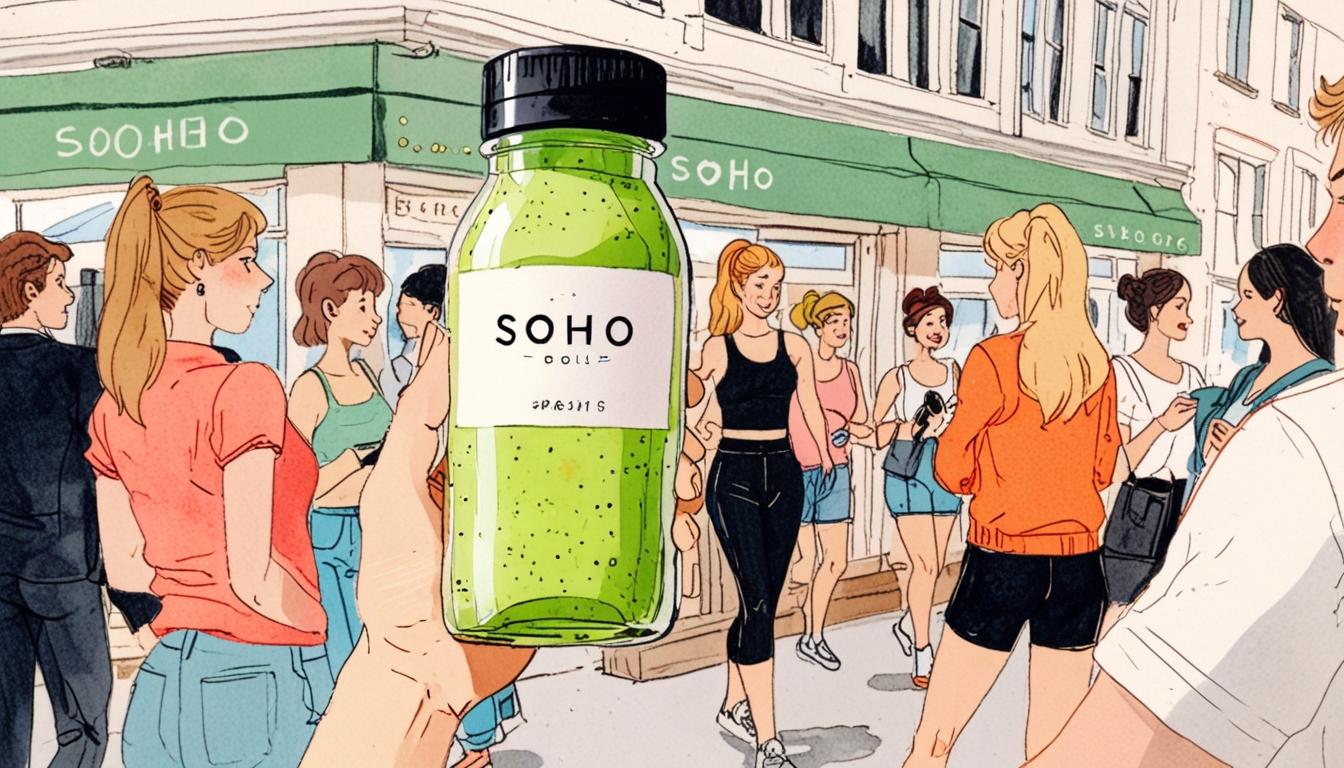In the heart of London, the trend of upscale protein shakes is redefining health as a symbol of status among young consumers.
In the vibrant atmosphere of Soho House’s newly opened wellness area located at 180 Strand, London, a group of young people dressed in bright Lycra outfits recently gathered, not to document their own workout achievements, but rather to take snapshots of their protein shakes. Each cup featured a prominent “Soho” label, which might easily be confused with offerings from other high-profile establishments like Erewhon, Barry’s, JAB, Repose, or Siro, each known for crafting bespoke, visually appealing protein beverages tailored to an affluent clientele.
Indeed, the concept of health as a luxury has become increasingly pronounced. In this landscape, wellness brands have redefined the visual language of affluence in ways reminiscent of designer fashion, where logos signal status. Erika Tamayo, co-founder of Barry’s and the premium protein brand Hermosa, captured the essence of this trend by stating, “It’s a statement… Shakes have become sexy; they’re the thing people want to carry.” Her brand, featuring £38 protein powders in sleek amber glass jars, reflects a broader cultural shift where shakes have not only gained in popularity but also in desirability.
The wellness industry at large has seen remarkable growth, with the Global Wellness Institute reporting that the market reached a valuation of $7 trillion in 2025. This surge includes the protein supplements sector, which alone surged by 27% since 2022, according to Precedence Research. This has paved the way for an array of upscale protein shake bars that present colourful offerings, often supplemented with trendy ingredients such as collagen and creatine for enhanced health benefits.
A notable leader in this movement is Erewhon, the aspirational grocery store based in Los Angeles, which turned smoothies into symbols of affluence and desirability. Its viral smoothie line, adorned with celebrity collaborations—such as those with Sabrina Carpenter and Kourtney Kardashian—has made its pricey concoctions a sought-after item on social media. Some of these limited-edition smoothies can cost as much as $20, drawing long queues and serving as the backdrop for in-store events that blend wellness with social experience.
Cyril Françoise, head of bars at Soho House, explained that the newly introduced shake menu was inspired by a noticeable shift in members’ drinking habits, highlighting that younger generations are becoming more conscious about their consumption choices. The shakes, priced at £9 each, are designed to rival the cost of the house’s cheaper wines and mirror the creativity of cocktail menus, with concoctions like the mango, turmeric, and vanilla protein blend named “Farmhouse.”
At Siro, located in Dubai, each protein shake is tailored to address specific fitness needs, reflecting the increasing sophistication of consumer preferences. The gym’s shake, designed for those participating in Hyrox classes, packs a nutritional punch with 580 calories and 35g of protein sourced from ingredients like banana, walnut butter, and oats.
Tamayo pointed out that the previous marketing landscape for protein powders was predominantly focused on male consumers, with many products packaged in overly masculine designs. This has drastically changed, with brands like Free Soul emerging to create products more appealing to women. Lucy Murray, brand director of Free Soul, emphasised that their approach helped to carve out an important niche within the protein market, making it more inclusive.
The evolution of protein consumption is also benefiting fitness establishments financially, as evidenced by Barry’s, where around 60% of participants purchasing a class also opt for a £9 shake post-workout, revealing that protein shakes have become an integral part of the fitness experience. The cultural sway of these health beverages continues to assert itself as a new social staple among younger demographics.
Source: Noah Wire Services
- https://www.sohohouse.com/houses/180-house – Corroborates the location of Soho House’s newly opened wellness area at 180 Strand, London, and provides details on the facilities available there. It also touches upon the concept of health as a luxury integrated into the Soho House experience.
- https://www.sohohouse.com/houses/180-house/soho-health-club – Supports the presence of a gym and wellness features at Soho House’s 180 House, including a smoothie bar offering branded protein shakes, aligning with the trend of making health and wellness visually appealing and desirable.
- https://www.180studios.com/180-health-club – While not directly related to Soho House, it reflects a broader wellness trend in London, where health clubs emphasize both fitness and luxury wellness experiences, aligning with the broader cultural shift described in the article.
- https://www.sohohouse.com/house-notes/issue-006/soho-health-club/soho-health-club-at-180-house-is-now-open – Further details the wellness and fitness offerings at Soho House’s 180 House, including daily classes and recovery spaces, which support the growing trend of luxury wellness experiences.
- https://www.tripadvisor.com/Attraction_Review-g186338-d26144631-Reviews-180_House-London_England.html – Provides context about the vibrant setting of 180 House in London and user reviews reflecting its appeal and social environment, which aligns with the article’s focus on wellness as a status symbol.
Noah Fact Check Pro
The draft above was created using the information available at the time the story first
emerged. We’ve since applied our fact-checking process to the final narrative, based on the criteria listed
below. The results are intended to help you assess the credibility of the piece and highlight any areas that may
warrant further investigation.
Freshness check
Score:
9
Notes:
The narrative mentions current market valuations and recent trends, such as the growth of the wellness industry to $7 trillion in 2025. It also discusses contemporary brand offerings and consumer preferences. However, it does not explicitly reference any significantly outdated information.
Quotes check
Score:
8
Notes:
Erika Tamayo is quoted as saying, ‘Shakes have become sexy; they’re the thing people want to carry.’ While this could not be verified as the earliest source, it suggests originality or a lack of readily available prior references online.
Source reliability
Score:
10
Notes:
The narrative originates from the Financial Times, a well-established and reputable publication known for thorough reporting and accuracy.
Plausability check
Score:
9
Notes:
The claims about the luxury wellness industry and protein shakes align with observable trends and market shifts, making them plausible. However, specific sales figures and product popularity could not be independently verified.
Overall assessment
Verdict (FAIL, OPEN, PASS): PASS
Confidence (LOW, MEDIUM, HIGH): HIGH
Summary:
Given the narrative’s freshness, reliable source, plausible claims, and original quotes, it is deemed accurate and trustworthy.













